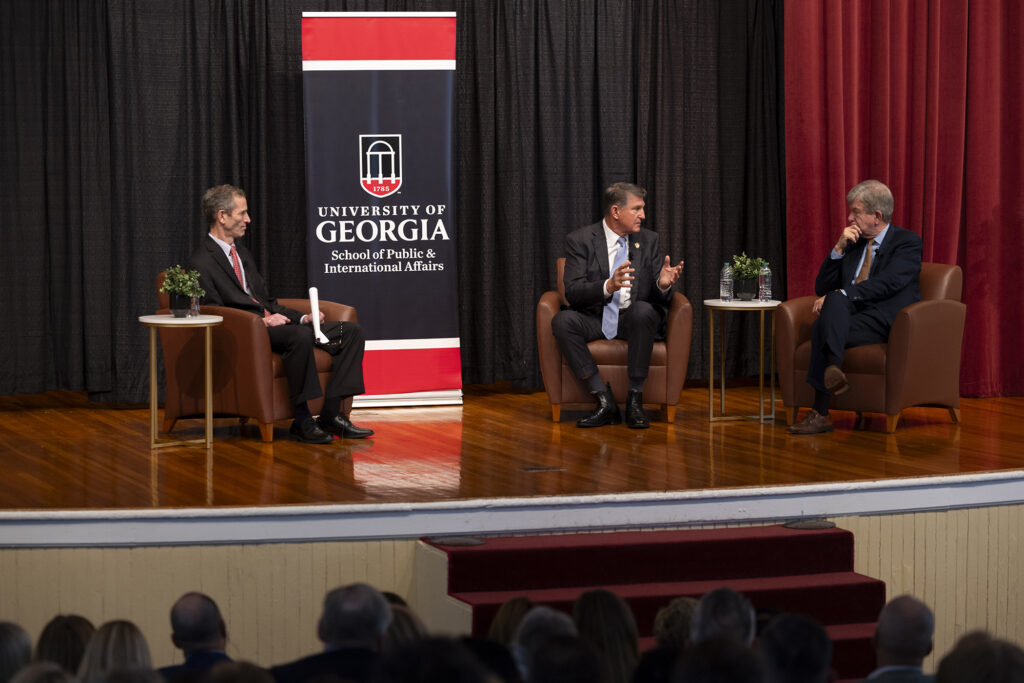
From left, Matt Auer, dean and Arch Professor of Public and International Affairs, moderates the inaugural Johnny Isakson Symposium on Political Civility with Senator Joe Manchin (D-WV) and former Senator Roy Blunt (R-MO). (Photo by Andrew Davis Tucker/UGA)
On Nov. 10, the University of Georgia School of Public and International Affairs hosted Senator Joe Manchin (D-WV) and former Senator Roy Blunt (R-MO) for the inaugural Johnny Isakson Symposium on Political Civility, an event that celebrates the late senator’s legendary qualities of decency, statesmanship, and dedication to common sense problem-solving in the public interest.
The symposium, which was held in UGA’s Chapel, was moderated by Matthew Auer, dean and Arch Professor of Public and International Affairs, and featured remarks by both senators on the topics of political civility and bipartisanship in the U.S. Senate.
Heath Garrett, former chief of staff and political strategist for Isakson, also addressed the audience, commending the character of the late senator. He pointed out the expanding imprint of Isakson’s legacy on campus, including the creation of the Isakson Center for Neurological Disease Research.
Senators Manchin and Blunt both expressed similar sentiments about their respective terms serving with Johnny Isakson in the U.S. Senate.
“Well, I thought the state was in pretty good shape, so maybe I could come and be a part of something and help our country,” Manchin said. “But when I got there, I found out that there were more people working against each other than there were working with each other, so I was looking for respite, and I found Johnny Isakson.”
Manchin currently serves as the chairman of the Senate Energy and Natural Resources Committee and also serves on the Senate Committee on Appropriations, the Senate Committee on Armed Services, and the Senate Committee on Veterans’ Affairs. Manchin, much like Isakson, has created a legacy of bipartisan compromise throughout his career in the U.S. Senate.
“I didn’t get involved in politics because of party affiliation,” Manchin said. “I got involved in the political process because I wanted to change things.”
He finds that, for the most part, division in policy arises over little details. The bottom line, for Manchin, is that “you can’t do it if you don’t have people on both sides that look for the good; you can’t let the perfect be the enemy of the good.”
Blunt concurred, stating, “It takes a bipartisan approach to get most things done. In fact, if you miss that opportunity, you really create a great target for one side if you can’t get anybody else on the other side to work with you.”
During his 12 years in the Senate, Blunt served as chairman of the Senate Republican Policy Committee and Senate Rules Committee and led the Presidential Inaugural Committees for the 45th and 46th Presidents of the United States. In addition, Blunt was a key member of the Appropriations and Commerce Committees and the Senate Select Committee on Intelligence.
Blunt continued, quoting former Senator Daniel Patrick Moynihan (D-NY), who said, “Everyone is entitled to their own opinions but not their own facts.” For Blunt, bipartisanship boils down to “how we once again take our different opinions, find a better way to agree on the facts, and then reach a successful conclusion.”
John Isakson, Isakson’s son, made closing remarks, memorializing his father.
“As sad as we all were at the end of his life and his passing,,I think I am equally, if not more, inspired at the beginning of his legacy,” John Isakson said.
To honor and perpetuate Isakson’s legacy of statesmanship, SPIA created the Johnny Isakson Legacy Fund to provide perpetual support to programs that advance political civility and encourage common-interest problem-solving. In addition to supporting the annual symposium, the fund will provide scholarships and awards aligned with the Isakson legacy of political civility, such as internship stipends for students working in organizations dedicated to bipartisanship and conflict resolution, as well as curricular development and research on creating a culture of civility, leading with civility and related topics.